@LeytonSchnell:
Educationalist and advocate for the non-normative learner
A “Twittering Task” by Christopher Spanis
For Dr. S. de Castell
UBC ETEC 565B
Disclaimer
First of all, I have to declare that I am not a twitter user. I, for some reason, find the platform frustrating and several attempts to “get on Twitter” due to professional “encouragement” have fizzled out. That said, I acknowledge the massive power and influence of this social medium(a) and the following is my attempt (from ignorance, as a novice) at an unbiased analysis of education, pedagogy, educational theory, philosophy, and practice; innovated, shared, discussed, and appreciated.
The Someone:
Public Twitter feed: @LaytonSchnell
Dr. Leyton Schnellert, UBC. Education researcher, Associate Professor in the Faculty of Education, and Eleanor Rix Professor of Rural Teacher Education.
What are they Talking About?
Leyton’s primary topics include rural education, teacher training, literacy, and supporting both teachers and diverse learners. His posts almost always convey gratitude, pride in others, acknowledgement, humility, reconciliation, and openness. I truly admire him and am honoured to know him.
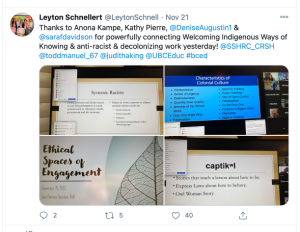
Rural Education
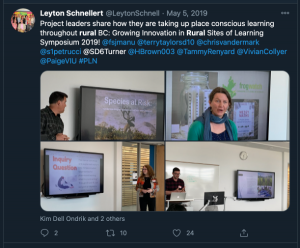
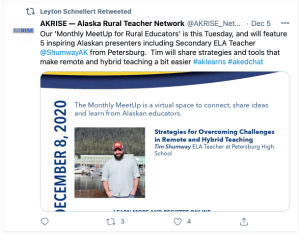
So interesting that investments in access and opportunity for remote learners would pay dividends to urban students come a global pandemic. Leyton has been an advocate and researcher for supporting rural education in BC (and beyond) through technology and pedagogy, in the top example, place-based learning.
Teacher training (middle years focus)
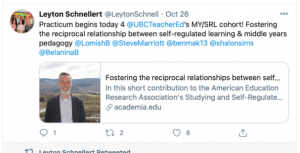
Leyton is an enthusiastic educational mentor and passionately promotes the injection of the honest self into one’s practice. This post on the intraconnectedness of pedagogy and self-regulated learning speaks to his own educational theoretical foundation of the importance of students developing metacognition, and the reflective and diffractive practices of teachers-in-training.
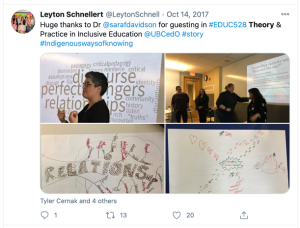
Another gracious post highlighting the ideas, work, and time shared by an educationalist in the Okanagan indigenous tradition. When Leyton pays his guests such honour and gratitude visibly to his students and colleagues, it subconsciously reinforces the notion that indigenous ways of knowing, and integrating them into teaching practice, are valuable and necessary. This as opposed to a tokenistic mention out of obligation as has been the case historically.

Literacy
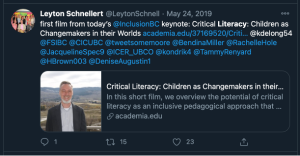
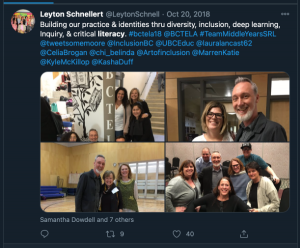
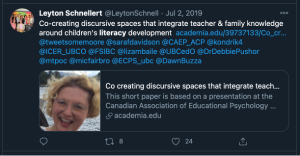
Leyton wrote extensively on literacy, namely reading and writing, for middle years in the 2000’s. In the last decade he has expanded his literacy work to include self-direction and criticism blended into inclusive education. This represents a refreshing departure from literacy as the “three R’s” as was discussed previously (e.g. de Castell and Luke).
Supporting Teachers, Supporting Diverse Learners
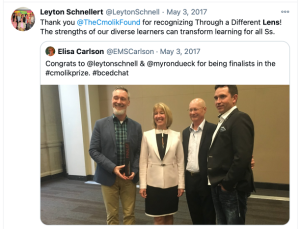
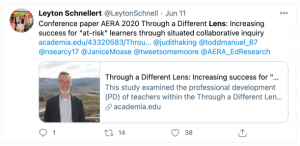
Leyton’s career and Twitter presence places special emphasis on diverse learners – marginalized, impoverished, dropout risk, kids who don’t fit in or for whom the traditional classroom model doesn’t work. He has been recognized for this work, and it represents a pedagogical shift from the grading standards of the twentieth century, and yet the notion of equal access to education harkens back to Dewey.
“Could curriculum, not should curriculum.”

This hashtag is meant to emphasize a transition in British Columbia over, at least, the past five years from a curriculum comprised of a specific “checklist” of prescribed learning outcomes (or P.L.O.’s) to one with centred on competencies with suggested content. I think this is meant to be liberating for teachers’ practice in that teachers are not only freer to cover topics of interest to themselves and the students, but also to not rush and teach at a pace that is suited to the children dynamically. However, I do also flinch when I read this hashtag as I think it presents a slippery slope, as we are finding evidence in my world of secondary academic subjects that students are coming in from elementary school with progressively weaker and weaker science, math, and reading literacy skills. I have no evidence that elementary teachers are not doing their jobs – surely other highly relevant literacies are being emphasised, but if the hashtag is taken to grant some teachers permission to omit entire fields of study important to students’ literacy, life-critical skills and abilities, then I am not on board.
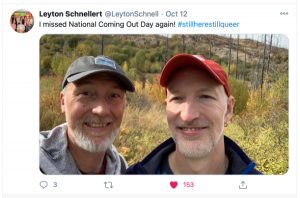
This one doesn’t speak directly to educational theory or pedagogy, but it is not entirely disconnected. I think it’s very important that Leyton, as a homosexual male, is open about so much of himself on a public stage. This is valuable for students, parents, teachers, and the general public to see: Leyton doesn’t just preach inclusivity, he lives it.
Who Are they talking about?
Leyton is a big fan of Shelley Moore and mentions her frequently. Some highlights of Leyton’s retweets include promoting leaders in inclusive education, teaching literacy and mathematics through gamification, SOGI events (sexual orientation and gender identity, an inclusive catch-all alternative to LGBTQ2S+), co-constructed curriculum, mentorship, and strategies on the timing of assessments in the learning process (not rushing to writing, building a knowledge base).
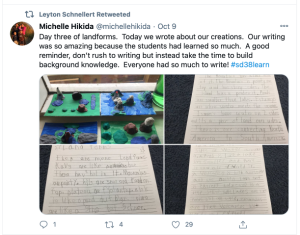
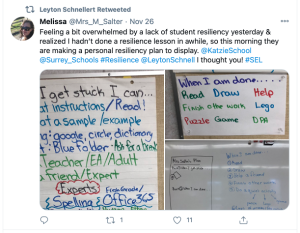
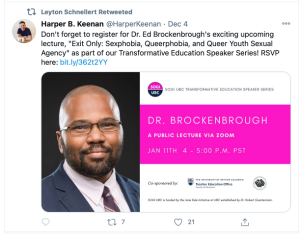
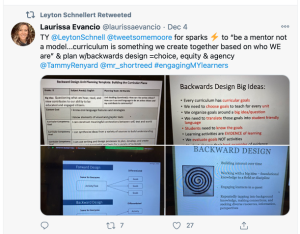
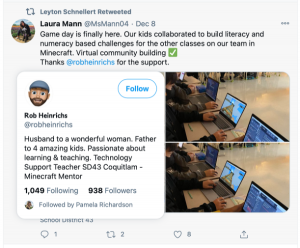
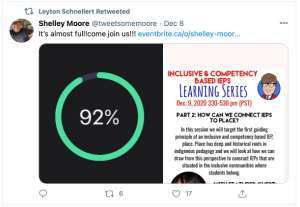
How and why does that matter to education?
Leyton has carved out an important position redefining what teachers traditionally take for granted. His account is very active, showcasing his work ethic and passion for changing the approach teachers take with students who have difficulty in schools from a deficit-based perspective to one of inclusivity. Leyton shows himself to be an advocate of strong educational theories and philosophies while not giving the air of an ivory tower academic. He is a boots on the ground, ear to the people educationalist.
How is Twitter reshaping “educational theory?”
In a positive way, Twitter has given teachers, parents, and students access to ideas that they otherwise would have been geographically, temporally, socioeconomically, or academically (as an exclusive community) isolated from. If we ignore for the moment the filtering algorithm of the Twitter feed, Twitter gives people access to people and ideas that they would have had no control over through other served-and-consumed media, such as television or radio (as in, one watches what’s on, rather than searching and watching on-demand).
So Twitter has changed the delivery method and accessibility of educational theory, that much is obvious, but has it also changed the content? That I am unsure of. Perhaps the speed with which ideas can and are being shared affects the evolution and criticism of ideas. Perhaps there is also an effect on the implementation of new practices, as seeing posts from theorists and other practitioners might make teachers more likely to try new practices compared to the traditional way of reading about them in research journals.
In a negative way, the bite-sized format of tweets and the architecture of a Twitter feed may contribute to a shallow internalization of content. Meaning: users read the headline and move on, either not getting the true meaning, perhaps getting the meaning but not receiving the nuance and complexity of a given topic/issue, or simply taking all feed items as truth and not parsing for validity. This is also problematic for attribution; users can post others’ ideas as their own and the tweet will be subsequently shared, misquoted, misinterpreted.
Personally, I have never taken to Twitter. I find I prefer longer narratives with more detail, which I can skim or ponder. I find tweets lack context or nuance due to the character limit, and the user interface makes it difficult to follow discourse, which may be by design or may be my ignorance and limited understanding of the platform. Leyton uses twitter as I would imagine doing (and briefly did), using it as a place to share links to work and the work of others. He tends not to tweet/post philosophy or pedagogy in sound bites. This is a great example of his research and professional work on accessibility – Twitter is an efficient way to reach people with links and to be reached and shared with, but critical educational conversations do not seem to be happening on Twitter. Or, if they are, they are not easy to find and follow. Twitter may be great for dissemination of theory but may not be the ideal platform for discourse of theory. …But it is the one we seem to have found ourselves on.